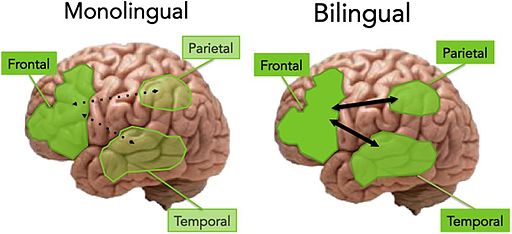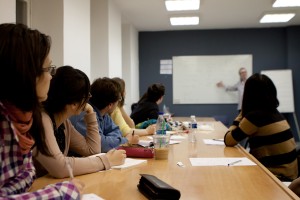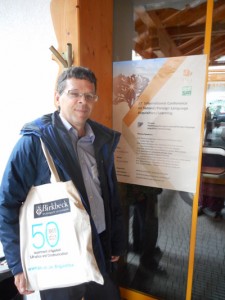Last week, the Research Excellence Framework (REF) results were announced, with the majority of Birkbeck’s research (83%) being confirmed as world-leading and internationally excellent. Professor Jean-Marc Dewaele, Professor of Applied Linguistics and Multilingualism, shares his wisdom on how to become a successful researcher.
Having been active in academia for more than 30 years, I realise that I have reached the pinnacle of my career in applied linguistics and multilingualism research. I’ve always been passionate about research and teaching, and I am lucky enough to work in an institution that allows me to focus on both.
Close to 30 of my former PhD students have made their way into academia and the wider world, and when we meet occasionally, we reflect on what it takes to become a successful researcher and how to climb the slippery career ladder. The first thing is undoubtedly luck: with health, work, relationships. None of those should suffer in the drive to become successful. By “successful”, I mean good quantity and quality of research output, resulting in citations and invitations to present one’s work and ideas at workshops, panels and conferences. It can also involve becoming part of international professional organisations, editorial boards, and spending time encouraging and guiding younger researchers. Of course, it is impossible to know in advance whether one will become successful. I would say that it is a mind-set. Think positively!
Practical advice also helps, which is why I’ve come up with these 21 tips on how to become a successful researcher. There is one caveat: if the drive to success undermines happiness, it is not worth it. It is definitely better to be a happy person rather than an unhappy -even successful- researcher. It is really a matter of balance.
- Be happy and curious, creative and courageous, regulate your emotions.
- Have your finger on the pulse of your field: Where is it heading? What are the exciting new developments (theoretical, epistemological and methodological)? How can you contribute to these new developments by adding something distinctive? Can you end up shaping the field?
- Establish what your unique selling points are: What are your strengths and what makes your research distinctive? Why should anyone care about what you have to say?
- Find your own unique academic voice: you’re not a robot, you need to stand out from the crowd – while still fitting in the community.
- Research is not a competition as there are no ‘winners’. It’s a collaborative enterprise: helping others means you will get help too if you ask for it.
- Be optimistic, resilient, humble, ambitious, conscientious, honest, excited, enthusiastic.
- Accept that all research requires a huge investment in effort and time – often much more than expected.
- Realise that while reviewers are often constructive in their comments on your work, some can also be mean and hostile: don’t let them rattle you. Build a mental shield to protect yourself when things get nasty (also at conferences) and don’t lose your cool.
- Visualise your name in print under the title of a new paper in an excellent journal.
- Build up a network of fellow researchers from a wide range of ages and experience, be visible, sociable, friendly and trustworthy.
- Organise panels on your topic and major conferences, then turn the contributions into a special issue for a good journal. Plant a flag, invite people to join you, use humour to dissipate tension.
- Realise that even the best and most experienced researchers don’t produce gold on the first attempt: rework papers endlessly until they reach the publication threshold. Pay attention to detail. Don’t be overly discouraged by rejections. Experienced researchers are able to benefit maximally from feedback, with the resulting publication being many times better than the original one.
- Realise that more time spent in front of the computer does not guarantee better quality work.
- Go walking and do physical activities that take your mind off academic work (music, dancing, sports…)
- Go to conferences to present your work in progress and check how it is received and what feedback you get.
- Offer to collaborate with fellow researchers if you feel your skills could complement theirs in reaching a common objective.
- Try to write (and present) better.
- Be generous in giving credit to people who influenced and helped you.
- Be able to switch off being a researcher sometimes, talk about something else, and listen to others’ views on arts and politics and life.
- Never submit a paper straight after finishing it: go for a walk first and think about every word and every reference and anything you may have forgotten to include or things that forgot to remove. A good night’s sleep before a final re-reading is also recommended.
- Disseminate your findings beyond academia and see whether your research may have practical implications that could boost social justice and equity.
Further information





















